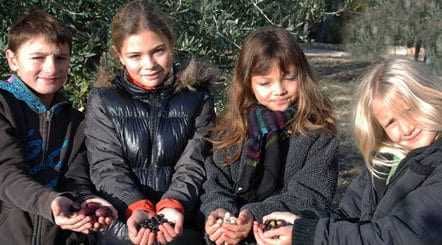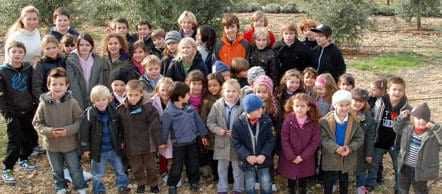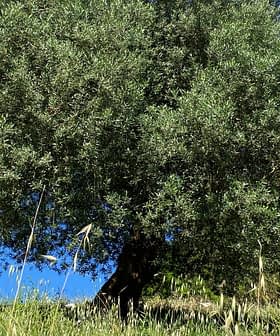
The Town Council of Sanary, a port town on the Mediterranean coast of France believes that educating young children is a great way to achieve and maintain a healthy olive oil culture for future generations.
Located in the heart of the Provence, one of the sunniest regions in France, Sanary is perfect for olive oil cultivation. The early learning program put into place will educate school children in the growing of olives and olive oil production. This is the first year of the pilot plan.
It all started in 2003 when the mayor of this Provençal town, Ferdinand Bernhard, decided to launch an action program for 21st century sustainable development. Determined to preserve the natural heritage as well as the environment, he rescued seven acres of abandoned wasteland formerly used for growing olive trees. After much clearing and cleaning among the old stones and hundred year old olive trees, the area was ready for planting.
In 2005, three hundred new olive trees were planted. Le Jardin des Oliviers (the olive tree garden) became a true olive grove paradise using environmentally friendly cultivation techniques. Today, the restored Jardin des Oliviers provides an ideal location for the activities of L’éducation à l’environnement pour un développement Durable(education for sustainable development, or EEDD)
Teaching school children about olives and olive oil is part of the pilot project launched by the mayor and EEED to educate children on sustainable development.

Early education of olives and olive oil mean doesn’t mean taking the 52 classes out to admire the fruit and trees. It is a well thought-out planned exercise.
The Town Council has taken on Chrystel Massa to oversee the project. As program manager for EEDD, she is responsible for coordinating, promoting and implementing pedagogical methods in schools. In addition, she is in charge of all visits by the children (olive oil mills and Le Jardin des Oliviers) as well as organizing experts to talk to the children.
“Learning activities will be mostly outdoor this first year. Three pedagogical outdoor studies are planned for next year to be followed by teaching in the classroom. Pedagogical methods will vary and be adapted according to class,” Chrystel said. The children, aged between five and eleven will take part in workshops, visits and fieldtrips; EEDD has already appointed three teachers for this first year.
November 25 was an exciting, fun and informative first day for organizers, teachers and children. Two classes, chosen for the pilot study this year visited Le Jardin des Oliviers and hand picked almost a hundred kilos of olives; each class was also allowed to plant an olive tree.
Jean Luc Granet, Delegate for the Environment at the Sanary City Council accompanied the 53 school children from schools in and around Sanary. A farmer and native of Sanary, Jean Luc recently trained in olive trees and organic olive oil farming. He was able to share his knowledge on the history of the site and the benefits of organic farming with the children.
He said “The teachers, pupils and I really appreciated this first experience even though we combined a class of kindergarten (four to five year old) and primary schools (10 to 11 year old) the teaching material was very well adapted.”
The second part of the project will involve a guided visit to an olive oil mill; classroom activities will include history and geography of olive trees as well as the health properties of olives.
The third part of the project planned for the spring will show pupils how growers deal with insect threats to the groves.
The children will each receive a bottle of olive oil obtained from the olives they picked on their first visit. Tapenade and olive oil bread made from traditional Mediterranean recipes will also be sampled by the lucky children.
Jardin des Oliviers is clearly a success. Planting of olive trees six years ago has produced 621 kilograms of olives and almost 100 liters of olive oil the first year. Today, the orchard contains 400 olive trees with at least a hundred different varieties. (Oleo Cayon, Cayet bleu, Grossanne)
And, the community continues to grow. The municipality has recently bought adjacent plots and more planting and growing will take place.
Jardin des Oliviers is in their second year of conversion hoping to have the French national AB label by 2013. Organic regulations in France stipulate a three year period of “bio” conditions before obtaining the organic label.
Jardin des Oliviers and Ecole des Oliviers are offering practical solutions in sustainable development. Significant Changes are being made to improve the environment with a community working towards a common goal.
Equally important, Ecole des Oliviers will be beneficial to the olive oil industry in France; when kids go to L’école des Oliviers they will learn how to nurture the long time culture of olive oil farming.
Photos: Bernard Laire








